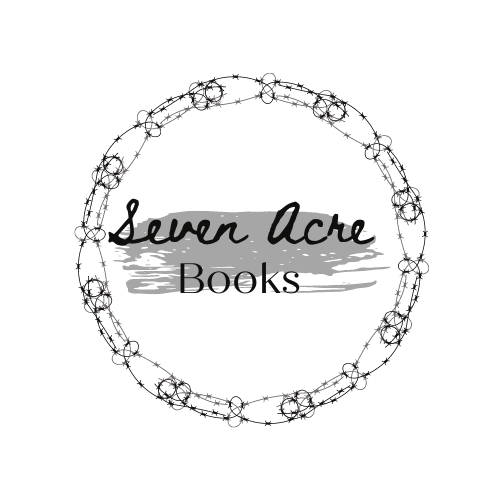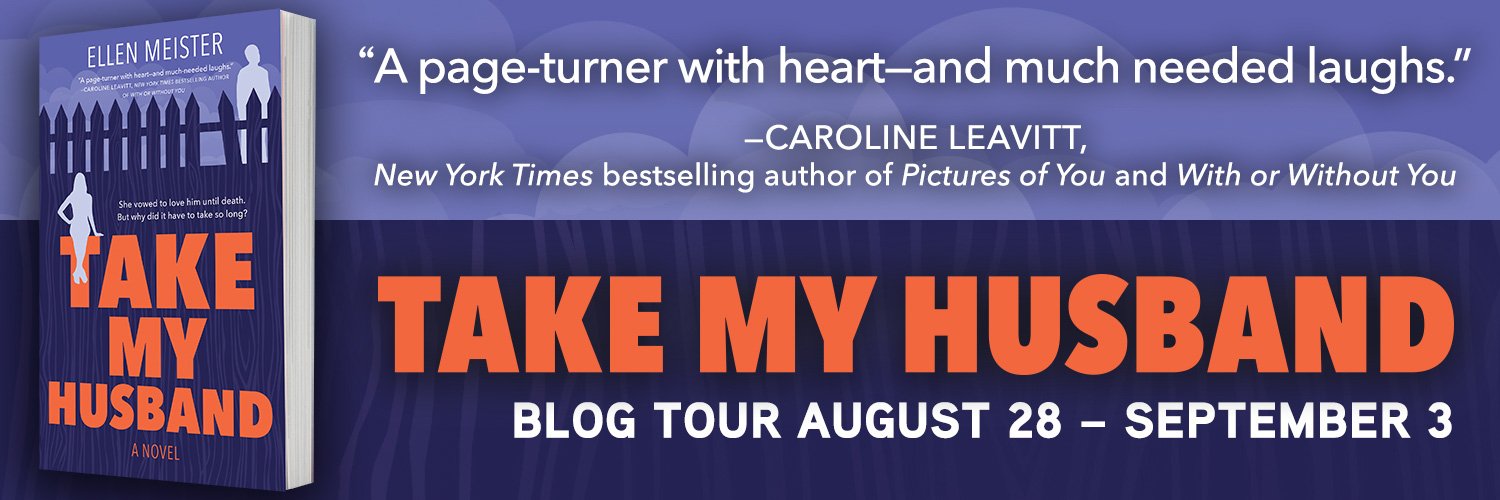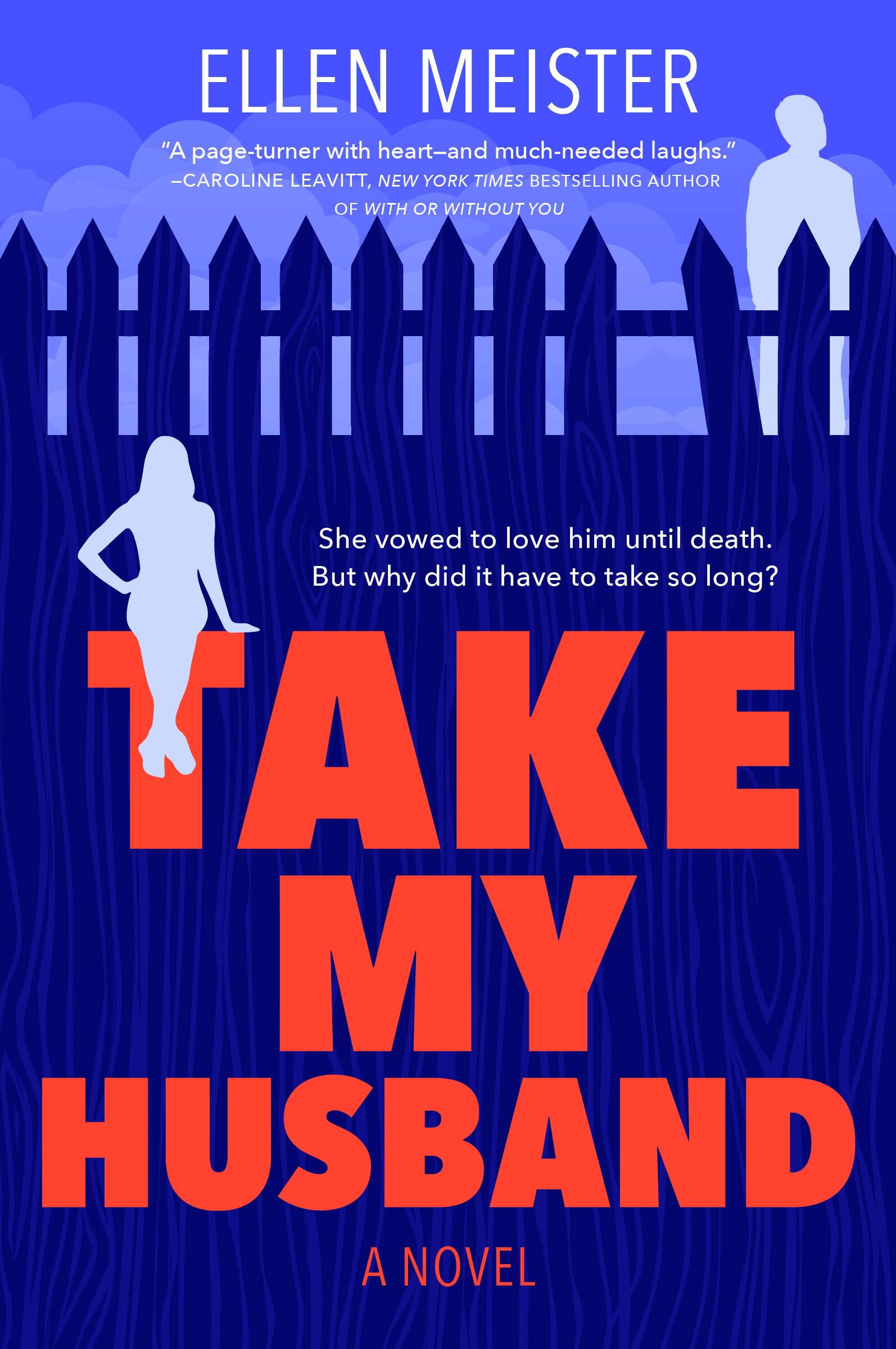#BlogTour! Take My Husband by Ellen Meister
/ABOUT THE BOOK:
A witty, insightful domestic comedy about one woman's unexpected, thought-provoking journey out of her marriage as she realizes how much better off she would be if her husband had not survived a serious car crash.
When Laurel Appelbaum gets a call at work from the local hospital informing her that her unemployed husband Doug has been in a serious car accident, she is in shock. Summoned immediately to his bedside, she doesn't know in what condition she will find him. As she rushes to the ER, her mind is full of dire thoughts of this abrupt and unpredictbale end to her marriage...that is until she remembers the large life insurance policy they are carrying in his name.
Suddenly Laurel can't help but imagine what a life on her own might look like...a new little cottage perhaps, the dog she has always wanted but can't have because of Doug's allergies, and the money to travel to see their only son. By the time she arrives she is ready to assume the role of grieving widow, only to find Doug sitting on a gurney, annoyed that she has taken so long to come pick him up. All of the tiny assaults on her freedom and dignity that have chipped away at their marriage and her happiness over the years flood in. She realizes now that she is finally ready to journey out of her marriage because the life really at stake is her own. She just has to figure out how to do it.
Read on for an excerpt from Take My Husband:
Laurel Applebaum heard a familiar ringtone as she shuffled toward the lockers at Trader Joe’s, tired and spent after a full day on her feet. Was that her phone? Her first instinct was to rush, but she stopped herself. It was probably her husband, Doug, with one of his inane emergencies, like running out of chocolate-covered almonds. God forbid he should go ten minutes without a snack.
The phone rang again, but still Laurel didn’t pick up her pace. She could have—there was always a little reserve left in the tank—but she decided to indulge in her end-of-the-day crankiness, even though she might pay for it later, when Doug started whining about his deprivations. For now, for this one moment she had to herself, it felt like a miniature vacation.
Sometimes, Laurel told herself she should get a job where she could sit all day, like her sister-in-law, who answered phones in a doctor’s office. Then Laurel would look at her co-worker Charlie Webb, who was more than twenty years her senior and the fastest cashier they had. Always smiling, he was beloved by staff and customers, and Laurel thought of him as a cross between Kris Kringle and the philosophical deathbed guy from Tuesdays With Morrie. He made her laugh. And want to be better.
By the time Laurel opened her locker, the ringing had stopped and started up again. She pulled her purse from its hook and fished out her phone. Sure enough, DOUG was on the caller ID.
“Hi,” she said wearily, hoping she conveyed enough pathos with the single syllable to elicit some sympathy.
“Laurel Applebaum?” said a woman’s voice.
A chill swept through her. Something was wrong.
“Yes?”
“I’m so glad I finally reached you. I’m calling from Plainview Hospital. Are you Douglas Applebaum’s next of kin?”
“That’s my husband,” she said, her scalp prickling, her whole body suddenly alert. An instinctive chill had her in its grip. “Is he okay? What’s wrong?”
“He was brought in by ambulance after a motor vehicle accident. We’re still assessing his condition, but he’s unconscious. Right now the doctors—”
“I’m not far,” Laurel said. “I’ll be there in ten minutes. Less.” She dropped her phone into her purse and grabbed her jacket. Dear god, was this really happening? And why did it take a near tragedy for her to remember how much she loved him?
I have to do better, she thought, a lump taking shape in her throat. I have to.
“Is everything okay?” asked Charlie Webb. He had been standing close by, which wasn’t unusual. Sweet as he was, the old guy was just this side of stalkerish when it came to Laurel.
She chalked it up to a harmless crush. To Charlie, Laurel was still in the blush of youth. But she understood that his age filtered her through a softening gauze. To most men, she was all but invisible—a fifty-two-year-old woman who maintained only the last vestiges of attractiveness. It had been at least ten years and as many pounds since anyone told her she resembled Diane Lane. Granted, she didn’t make the effort she used to, but she simply couldn’t see the point.
She looked into Charlie’s kind face. “I don’t think so,” she said, her eyes watering. “Doug’s been in an accident. They wouldn’t have called me unless…” She searched his expression, hoping she didn’t have to finish the sentence.
He nodded and took her by the shoulders. “You’re going to be okay,” he said slowly, “no matter what. You are here and you’re fine. You only have one job right now, and that’s to drive carefully. You understand?”
The cadence of his speech slowed her rocketing heart, but she was suddenly so overcome by his concern she couldn’t speak. So she gave him a quick hug, and dashed out.
Laurel slammed the door of her twelve-year-old Altima, considering Charlie’s advice as she pulled her seat belt across her torso. Drive Carefully, she thought, turning the words into initials. It was something she often did to settle herself, playing a game where she tried to think of famous people to match the letters. DC=Don Cheadle, Dana Carvey, Diahann Carroll.
Calmer, she realized Charlie was right—she didn’t need to tear out of the lot. Reaching the hospital two minutes faster was not going to make a difference. Because realistically, she thought as the bulge in her throat swelled and tightened, Doug was probably already dead. She could almost feel it in her bones. He was gone, the life snuffed from his body. That was why she had been summoned. The hospital probably had a policy against giving next of kin the news over the phone.
Once she got there, she would be pulled into a private room by a doctor and a social worker. They would tell her they did everything they could, and ask if there was anyone they could call for her. She thought about her mother, elderly and detached, who would be no help at all. Then, of course, there was Doug’s sister, Abby, who was just the opposite. She would want to push in and take over.
Laurel bristled at the thought as her salty tears began to dry on her face, contracting the skin on her cheeks. Abby. God, she was annoying. The woman had an answer for everything. And usually, it was wrong. Maybe Laurel wouldn’t call her right away.
But no, Abby could be helpful if she stayed in her damned lane. Laurel would just have to be strong, assertive. She would give Abby a list of people to call. That would make her feel useful and important. Keep her out of Laurel’s hair.
And then, well, Laurel would have to make the most difficult call of all—to her son, Evan, who lived on the West Coast and was expecting his first child. He’d want to fly to Long Island for the funeral, but what about his wife, Samara? She was having a difficult pregnancy and might not be allowed to fly. Maybe Evan wouldn’t even feel comfortable leaving her.
It was painful to consider, and Laurel shook her head. She was making this too complicated. Of course they would both come to the funeral.
The thought of seeing them lightened her heart. She’d been depressed about not being able to fly out there for the birth of their child. Money was just so tight, with Doug still out of work. And he had insisted it was foolish for them to get any further in the hole on their credit cards. But now…now she’d be free to buy a ticket without getting into a fight about it. At least there was that. She would finally get her wish of being there for the birth of her first grandchild, to hell with credit card debt.
And then Laurel had a thought that made her gasp. She hadn’t remembered it until this moment. Doug had a huge life insurance policy—$850,000. So much money! It would solve everything. She’d be able to pay off all the credit cards. She could sell the house, and move to a cute little apartment, all by herself, and live off the savings. My place, she would call it. The decor would be soft and cool, in shades of aquamarine and sand. She imagined getting up in the morning without thinking about making Doug breakfast, setting out his vitamins and medication, picking up his damp towels from the bathroom floor, washing the dishes he left in the sink, swiping his crumbs off the counter. There were always so many damned crumbs. But now, she might even get a little dog. Doug was allergic so she had never been able to, and the thought of it filled her.
Laurel stretched in the seat, thinking how lovely it would be to quit the long shifts at Trader Joe’s and give her aching back a rest. And with no job, she would be able to stay home with a new puppy to train it.
And then there was her mother, who desperately wanted Laurel to spend more time with her. This could be just what their relationship needed. Laurel imagined her mother being so grateful for the extra attention she might even summon the courage to take a break from her vintage doll collection and leave the house. Laurel warmed at the thought, the tension in her throat easing.
And of course, that would be nothing compared to holding her first grandchild. How she loved newborns! Their impossibly tiny noses, their kernel-sized toes, the smell of heat rising off their velvety little heads. She imagined a baby girl with Evan’s silky dark hair.
By the time she parked at the hospital, Laurel was trying to work out whether it made sense to get a dog right away, or if she should wait until after the birth of the baby, so she wouldn’t need to worry about finding someone to care for it while she was in California.
She stopped the thought in its tracks. This wasn’t about her, it was about Doug, and she needed to be sadder. He was her husband. They had been married for nearly thirty years. Laurel tried to picture the early days of their courtship, recalling when they first met. She had just landed her first real job, working in the marketing department of a trade magazine publisher, when one of the women in her office offered to fix her up with a friend of her husband’s. “A solid citizen,” the woman had said, and Laurel took it to mean he was someone she could trust.
The phrase stuck with her all these years because it had defined Doug from their very first meeting. He was an honest and decent man who had gone into his father’s business. Eight years older than Laurel, he had a boyish face, unruly hair that charmed her, and an irresistibly corny sense of humor. Even on that first date, she didn’t mind that he was overweight. It made her feel safe to be with someone who wasn’t all that attractive to other women. Here was a man who would always be faithful. And also, he thought he was the luckiest guy in the world to be dating someone so very pretty. She was even flattered by his jealousy. It made her feel like a princess.
When he proposed six months later, Laurel was dizzy with joy. She was young—barely twenty-two—but she had always dreamed of being a wife. And she was being offered a sparkling emerald cut diamond solitaire ring by a man who wanted her so desperately he couldn’t wait to make it official. She’d been so overcome she could barely choke out the word yes.
Laurel parked and pulled a tissue from her purse, well aware of what she was doing—digging into memories to feel appropriately sad. It worked. Her heart felt leaden as she slammed her car door and hurried to the emergency room entrance.
“I got a call about my husband, Douglas Applebaum,” she said to the woman at the desk. “He was…in an accident.” She arranged her face into a stoic expression so the receptionist would understand she was prepared for whatever bad news was about to unfold.
But the woman remained impassive as she tapped at her computer, asked for ID, and then printed out an adhesive name badge. “Observation unit 4B,” she said, handing it to Laurel.
“What?” Laurel asked, confused. She had expected someone to come out and greet her.
The woman pointed a long nail embedded with a diamond chip. “Straight down that hall, all the way to the end. Make a right, show your badge to the security guard.”
For a lingering moment, Laurel stood transfixed by the glamorous manicure, a covetous urge growing tight in her gut. She hid her raw, unmanicured hands behind her back as she recalled better days, when she would indulge in mani-pedis with her friend Monica, as they laughed and gossiped.
And then, just like that, the nostalgia was replaced with furious reproach. How could she possibly be so shallow? Especially now, when there was so much at stake.
Guilt brought her back to the present, where she tried to focus on the instructions she had just been given. Dazed, Laurel did as she was asked, going through door after door until she found herself in a room full of patients in reclining chairs, separated by curtains. Some were alone, others had a loved one sitting close by in a plastic seat, crowded into the tiny space. Medical professionals buzzed around the middle of the room, going from patient to patient. The air was too hot, and smelled like disinfectant.
Laurel followed the signs. 1B, 2B, 3B, and then she stood before 4B, where two nurses in lavender scrubs hovered over a patient, blocking her view. One was leaning across him, pulling off a Velcro blood pressure cuff, and the other adjusted a bag of clear liquid hanging on an IV pole. The patient said something to make both nurses laugh, and then they took a step back, as if sensing Laurel’s presence.
And there he was, lounging in the reclining chair, a purple bruise across his forehead.
Laurel stopped and blinked, taking it in. The IV bag was connected to his arm by a thin tube. He wore the faded plaid shirt she’d been trying to get him to throw out, his belly hanging over his belt.
“Doug?” she asked, trying to make sense of the tableau before her. There was, she knew a term for what she was experiencing. Cognitive dissonance. Still, she couldn’t understand what she was looking at. That is, until he spoke.
“Did you bring me a snack?”
Excerpted from Take My Husband by Ellen Meister. Copyright © 2022 by Ellen Meister. Published by arrangement with Harlequin Books S.A.
ABOUT THE AUTHOR:
Ellen Meister is the author of several novels including THE ROOFTOP PARTY, LOVE SOLD SEPARATELY, DOROTHY PARKER DRANK HERE; THE OTHER LIFE and others. Ellen is also an editor, book coach, ghostwriter, and frequent contributor to Long Island Woman Magazine. She teaches creative writing at Long Island University Hutton House Lectures and previously at Hofstra University. Her latest novel is TAKE MY HUSBAND. For more info visit ellenmeister.com.
SOCIAL LINKS:
Author Website Instagram Twitter Goodreads
Take My Husband
Ellen Meister
On Sale Date: August 30, 2022
9780778309871
Trade Paperback
$16.99 USD
400 Pages

























